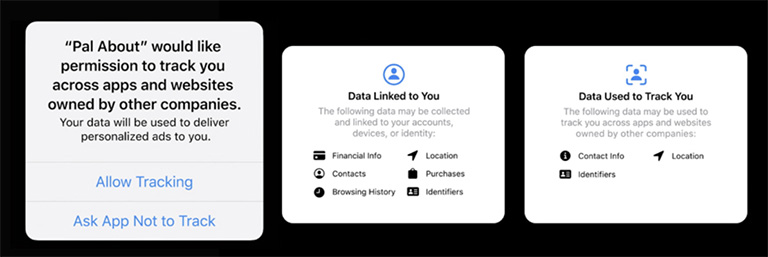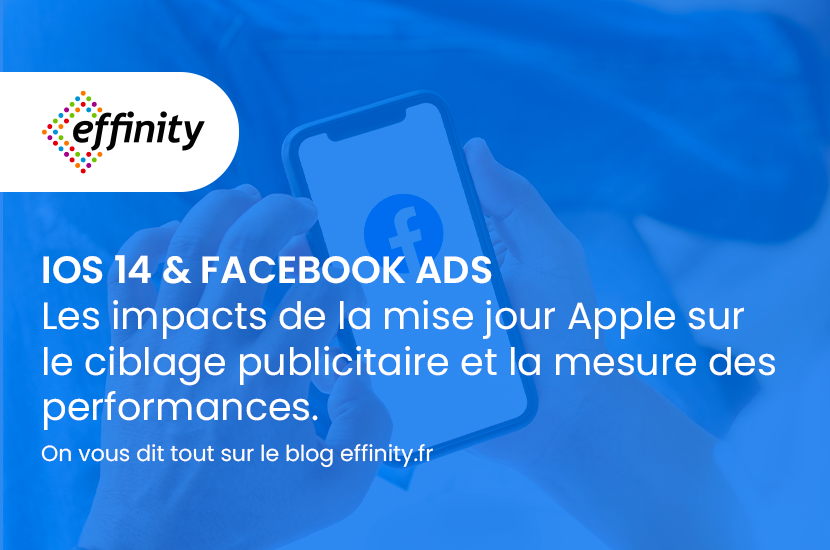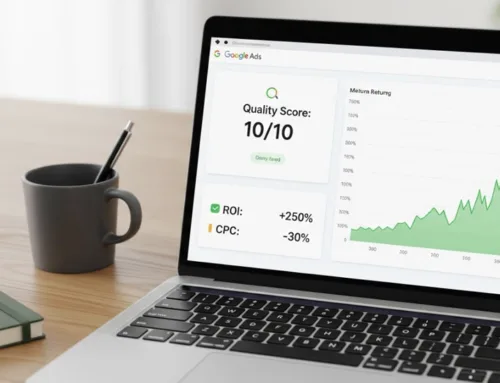With iOS 14, Apple, in April 2021, made a pivotal privacy update. From now on, Apple gives consumers greater control over the data they share (sometimes unknowingly) with the various applications they use. In France, 23.4% of cell phone users are on an iPhone.
This update has 2 major consequences:
- the first on advertising targeting
- the second on performance measurement
What updates has Apple released for IOS 14?
Unlike desktop browsers, mobile devices don’t use cookies. Instead, Apple provides the IDFA (Identifier for Advertisers), a unique and completely random identification number assigned to each iOS device. In addition to tracking browsers, the IDFA can be used to track user behavior within applications.
With the move to IOS 14.5, Apple has disabled IDFA by default, and allows users to select their preferences as illustrated below.

A few weeks after the roll-out of this update, Flurry Analytics unveiled a survey of 5.4 million people worldwide, and the result is edifying: 87% of users would refuse ad tracking.
What are the concrete changes to Facebook Ads?
Targeting
If you refuse tracking, all user data outside the application is affected, in particular browsing data from advertisements. This has an impact on the targeting of Facebook Ads.
In other words, it’s the retargeting audiences that are most affected by this development; 6 months after the rollout of iOS14, we’re seeing a drop in reach on iOS devices (iPhone and iPad) of between 40% and 60% for some advertisers. As retargeting campaigns are, by their very nature, conversion campaigns, this has a direct impact on the profitability of the systems in place.
Lookalike audiences are also impacted, to a lesser extent. The construction of these audiences is based in part on in-app behavior (on Facebook and Instagram), but also on out-of-app behavior; notably thanks to browsing data (captured by Facebook pixels). With the disappearance of some of this data, it is therefore logical to imagine a decline in targeting relevance.
The reports
The first impact is that, logically enough, if retargeting audiences are affected, so is measurement. In particular, as Facebook loses the ability to track the activity of some of its users. It is therefore logical to note a drop in the volume of conversions tracked, even if your other KPI’s remain stable (notably CTR); this translates into a possible drop in ROI or an increase in CPA.
This also lengthens the learning curve for campaigns, as the number of tracked events decreases.
Second impact: the default conversion window has been reduced from 28 days to 7 days post-click, and 1 day post view maximum.
The third impact is that it is no longer possible to drill down into performance, studying conversions by gender, age group or placement to identify the best performers. The rollout of iOS14.5 therefore results in a poorer level of analysis.
How to limit the impact of iOS 14 on Facebook Ads?
Check your domain
If you haven’t already done so, check your domain name via Facebook Ads. This will enable Facebook to request authorization via Apple’s App Tracking Transparency (ATT) to measure conversion events that have taken place on devices running iOS 14.5.
Prioritize your conversion events
As mentioned above, you can only have 8 different conversion events. We strongly advise you to sort and prioritize them.
Use re-engagement audiences
Facebook still has a lot of data you can use. These include targeting users who have engaged with your content or page in the past, people who have watched one of your videos or those who have clicked on an ad.
If third-party data is limited or unavailable, you can always try your luck with Facebook’s first-party data.
Set up the conversions API
As many reporting problems occur with the Facebook Pixel, the Conversions API allows you to transmit data directly from the server to Facebook. This API allows you to connect your site’s data and events directly to Facebook servers. The tool will analyze your users’ behavior and can then transmit various events to Facebook, such as form registrations, shopping cart additions and purchases.
The Effinity team’s opinion
These changes are forcing advertisers to change the way they analyze results on Facebook Ads. In addition to the loss of data from users who have refused trackers outside Apps, the experts at our
However, setting up an API remains the most complete solution for the time being.
Effinity can help you integrate the Facebook API for conversion measurement. You can also call on us for all your Facebook Ads needs, such as taking full advantage of Facebook Dynamic product ads.




